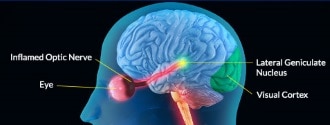AstraZeneca and its global biologics research and development arm, MedImmune, today announced that the US Food and Drug Administration (FDA) has granted Orphan Drug Designation for the investigational anti-CD19 monoclonal antibody, MEDI-551, for the treatment of patients with neuromyelitis optica (NMO) as well as neuromyelitis optica spectrum disorders (NMOSD). Developed by MedImmune, MEDI-551 is currently in Phase IIb clinical development for NMO.
NMO is a rare, life-threatening autoimmune disease of the central nervous system in which the body’s immune system attacks healthy cells, most commonly in the optic nerves and spinal cord, resulting in severe damage. NMO causes severe muscle weakness and paralysis, loss of vision, respiratory failure, problems with bowel and bladder function and neuropathic pain.1 There is currently no cure or approved medicine for NMO, which affects about five in 100,000 people.
Bing Yao, Senior Vice President, R&D and Head of the Respiratory, Inflammation and Autoimmunity Innovative Medicines unit, MedImmune, said: “The orphan designation for MEDI-551 underscores the significant need for an effective medicine for NMO, a rare, devastating disease which causes increasing damage and disability with each attack. MEDI-551 has a unique, targeted mechanism of action offering potential for the treatment of NMO. We look forward to working with the FDA to advance MEDI-551 to patients suffering from NMO as quickly as possible.”
Research has shown that patients with NMO and NMOSD develop antibodies against a protein in their body called aquaporin-4, and these antibodies play a key role in NMO disease pathogenesis. MEDI-551 directly targets and depletes cells that produce these antibodies.
The FDA’s Orphan Drug Designation programme provides orphan status to potential medicines intended for the safe and effective treatment, diagnosis or prevention of rare diseases or disorders that affect fewer than 200,000 people in the US2.


















